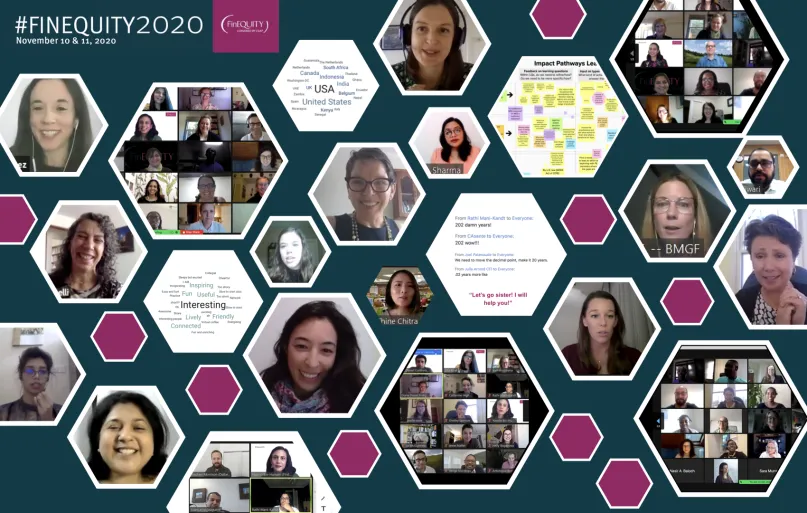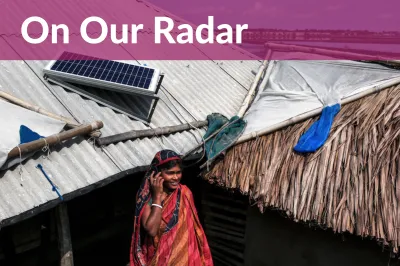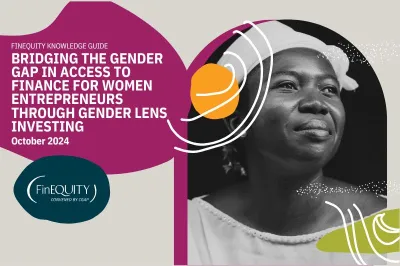Crisis as an Inflection Point for Women’s Financial Inclusion:
Some key insights and resources we take away from #FinEquity2020

#FinEquity2020, the annual gathering of the global FinEquity community convened by CGAP, brought together 375 practitioners, researchers, policy makers, and donors.
Nearly a year into the Covid-19 pandemic, FinEquity members are coming to grips with the challenges of operating in a prolonged crisis. Yet with the urgency that accompanies crisis often comes the opportunity to accelerate progress. We are convinced this can be the case for our work, which is why we chose Crisis as an Inflection Point for Women’s Financial Inclusion as the theme for our event.
We designed the #FinEquity2020 Agenda to showcase our members’ practical solutions to increasing women’s resilience to crisis while keeping in mind the necessity of mitigating risks exacerbated by the pandemic. Please find #FinEquity2020 videos and slides on our Recap Page.
Here are some key insights and resources we take away from #FinEquity2020:
- Advancing women’s resilience through financial inclusion will require data analytics, the further promotion of digital tools, and the continued implementation of targeted interventions.
Robust, actionable gender-disaggregated data are essential to all stakeholders working to advance the goals of financial inclusion. Launched at #FinEquity2020, the FinEquity Gender Data Brief consolidates the most relevant demand and supply-side financial inclusion gender-disaggregated data sets currently available. Together with the use cases described in the brief, these data sources provide a starting point to unpack gender dynamics in financial inclusion. In addition, FinEquity members and other stakeholders regularly collect and share additional data, such as on the impact of COVID-19 on women’s financial resilience.
Capacity building in digital financial literacy and digital payment channels has proven in-demand and effective in the wake of COVID-19. BSR’s HERproject found that wage digitization alongside financial capability training helped women garment workers in Bangladesh continue to receive salaries when the factories where they worked were closed during lockdown. The ability to top-up their phones and send money to their families while staying at home helped women smooth consumption and support their networks. Further learnings from the HERproject indicate that to boost resilience, digitization must be accompanied by financial capability and gender norms training.
In order to make digital financial services work, digital financial literacy is key to building women’s trust in products and services as well as their skills in using them. This is explored in-depth in SIA’s digital financial literacy campaign Hey Sister, Show Me the Mobile Money. Of the 10 project modules currently available in Ghana, Uganda, and Malawi, the most accessed topics are on how-to open a mobile money account, how to avoid scams, and how to spot misinformation.
It is not just users who require intervention. Initiatives like the BOMA project in Northern Kenya have been working to correct provider misperceptions regarding the viability of digital financial services for women in remote rural communities by documenting their thriving businesses and financial lives.
Without addressing gender-specific levers of change within the financial ecosystem, current resilience advances will be fleeting and unlikely to help during the next crisis. Interventions by UNCDF’s Gender and Inclusive Digital Economies are designed to identify and address market constraints for gender equality and women’s economic empowerment. By mapping women’s and girls’ financial service needs based on a lifecycle approach, initiatives are able to focus on increasing the number of affordable digital and financial products to meet the needs of diverse segments of women.
- Mitigating the risks to women’s economic empowerment and financial inclusion brought on by the current pandemic and other protracted crises requires long-term vision, as well as holistic and inclusive approaches.
During a crisis we risk focusing on short-term gains, however gender barriers are deeply embedded and creating sustainable change takes time. KIT’s Gender Lens Investing approach highlights how norms that shape behavior at the individual level sometimes become transferred into institutional behaviors and structures, inadvertently reinforcing gender-based barriers. One of their learnings in working with financial service providers is that, in addition to gender-specific product development, it is essential to prioritize building internal capacities, for example, training frontline staff on the specific barriers that women face in accessing and using financial services. KIT has developed an array of tools to help community members take on this challenge.
Without a thorough understanding of the gender digital divide, we risk focusing solutions too narrowly and providing insufficient support to women with differing needs. UNESCAP’s Catalyzing Women’s Entrepreneurship Program found that while online platforms help women entrepreneurs quickly shift and adapt their businesses to new markets, many women still need support services and financial products in order to succeed. Through a challenge fund (one of its four key pillars) UNESCAP co-funds and provides technical support to FinTechs to pilot innovative digital solutions and/or digital financial solutions that support women entrepreneurs such as digital loans, digital credit scoring, and accounting apps.
The best way to identify risks and solutions is to elevate women’s voices and perspectives in relevant policies and regulations. UNCDF’s Africa Policy Accelerator supports governments to consult with consumer protection groups on developing policies and regulations related to digital financial services. Policy makers and regulators can make better policy decisions when they consult directly with women. This approach helps establish a regular feedback mechanism to address issues such as consumer protection and risk-based customer due diligence. For example, Bank of Sierra Leone has built a network of community leaders to help implement their financial literacy framework and is currently consulting across the country on their financial service consumer guidelines.
- Accelerating progress requires promoting innovations and collaborations to design the most effective responses to the financial inclusion challenges faced by many women in developing countries.
Innovations focusing on accessibility of financial services are a crucial first step. Women’s Microbank in Papua New Guinea has pioneered opening accounts via tablets at its more remote access points using biometric identification. This has led to a near doubling of their credit portfolio. Meanwhile, CEGA at UC Berkeley has piloted a gender-differentiated credit scoring model whereby 80% of women who participated received higher credit scores, which in turn increased their eligibility for digital loans.
With new players come opportunities for new kinds of previously inconceivable partnerships. Gojek, a ride-hailing, food delivery, and digital payment and credit platform operational in five countries in Southeast Asia, has a wealth of experience empowering its women DFS users and entrepreneurs through tailored financial services and capacity building initiatives. Partnering with local banks, Gojek funnels loans to its MSME entrepreneurs. In addition, in order to reach women at scale, its training modules are hosted on UN Women’s WeLearn platform.
Complementary to such formal platforms is the phenomenon of “informal online commerce”, explored by CGAP in Myanmar, Pakistan, and Bangladesh, whereby women use social media platforms to market products and engage with customers by following through with a variety of local payment and fulfillment options.
#FinEquity2020 was designed to harness the collective experience, knowledge, and influence of our community with the goal of progressing in our mission of advancing women’s financial inclusion globally. Topics including resilience, digital financial literacy, and social norms will be explored within FinEquity’s new learning themes as outlined in Diana Dezso’s blog FinEquity2020 and Beyond.
We look forward to sharing learning questions, activities, and opportunities for collaboration over the next few weeks and months (also see our Engaging with FinEquity page for further ways to increase your participation).
Thank you again for being a member of our growing community!


